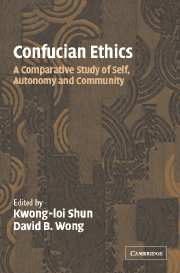Book contents
- Frontmatter
- Contents
- Contributors
- Contributors
- Introduction
- SECTION I RIGHTS AND COMMUNITY
- 1 Are Individual Rights Necessary? A Confucian Perspective
- 2 Rights and Community in Confucianism
- 3 Whose Democracy? Which Rights? A Confucian Critique of Modern Western Liberalism
- 4 The Normative Impact of Comparative Ethics: Human Rights
- SECTION II SELF AND SELF-CULTIVATION
- SECTION III COMMENTS
- Glossary of Chinese Terms
- Index
1 - Are Individual Rights Necessary? A Confucian Perspective
Published online by Cambridge University Press: 08 December 2009
- Frontmatter
- Contents
- Contributors
- Contributors
- Introduction
- SECTION I RIGHTS AND COMMUNITY
- 1 Are Individual Rights Necessary? A Confucian Perspective
- 2 Rights and Community in Confucianism
- 3 Whose Democracy? Which Rights? A Confucian Critique of Modern Western Liberalism
- 4 The Normative Impact of Comparative Ethics: Human Rights
- SECTION II SELF AND SELF-CULTIVATION
- SECTION III COMMENTS
- Glossary of Chinese Terms
- Index
Summary
WHERE INDIVIDUAL RIGHTS ARE OUT OF PLACE
I would like to begin by considering some familiar contexts in which talk of rights, especially those one person might claim against another, seems quite out of place.
On sports teams, say basketball, people have assigned roles appropriate to their various talents. A point guard is, among other things, in charge of running the offense, doing most of the ball handling, setting up plays, and getting the ball to people in scoring position. A center, usually the tallest player on the team, is responsible for dominating the area under the basket, rebounding, blocking shots, and scoring from inside. Suppose that on a specific occasion, the point guard fails to pass the ball to the center who is wide open under the opposing team's basket. What might one say? That the point guard made a mistake, did something wrong or incorrect, did not do what she was supposed to, failed to do her job, messed up, or fouled up. If, for whatever reason, she regularly misses such opportunities, she can be regarded as a poor or bad point guard and is likely to lose her position. Other members of the team can legitimately complain about her incompetence, lack of court sense, or selfishness, although in the name of team spirit they should not be too quick to criticize. […]
- Type
- Chapter
- Information
- Confucian EthicsA Comparative Study of Self, Autonomy, and Community, pp. 11 - 30Publisher: Cambridge University PressPrint publication year: 2004
- 22
- Cited by



